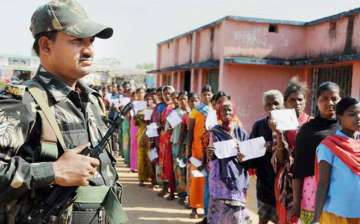Assembly polls: Every third lawmaker has a criminal record, over 50 per cent are crorepatis
New Delhi: The assembly polls in five states are over and the results are out. The victors are busy celebrating; others introspecting. Now that the chaos of campaigning, voting and the results has begun to

New Delhi: The assembly polls in five states are over and the results are out. The victors are busy celebrating; others introspecting. Now that the chaos of campaigning, voting and the results has begun to settle down, it is important to reflect upon the choices of the people in India’s festival of democracy. Facts, we believe, would be the best medicine.
Sample the following:
As many as 83 MLAs (62%) out of the 140 who have been elected in the just concluded Kerala Assembly elections have a criminal case filed against them. In other words, almost every second lawmaker in Kerala has a criminal record, according to the statistics compiled by Association for Democratic Reforms. 55 MLAs (39%) have had education till the 5th to 12th standard and 61 MLAs (44%) have declared themselves as crorepatis in Kerala.
In contrast, neighbouring state Tamil Nadu has elected 75 lawmakers (32%) out of 232 who have declared criminal cases against them. Succinctly put; every third legislator has a criminal record.
90 (40.36%) MLAs have declared their education qualification to be between 5th pass and 12th. And a whopping 170 lawmakers (76.2%) are crorepatis in the state.
West Bengal has sent 88 candidates (30%) with criminal records to its 294 seats assembly. The state has the maximum percentage (32%) of MLAs with declared serious criminal cases. 94 (32%) MLAs have declared their education qualification to be between 8 th pass and 12th pass. The state has 100 (34%) crorepati MLAs.
Assam has the lowest proportion of legislators with a criminal case. Only 13 of the 126 MLAs have a case lodged against them. 42 (33%) MLAs have declared their education qualification to be between 5th pass and 12th pass. A total of 72 MLAs (57%) have declared themselves crorepatis.
The proportion is a little higher in Puducherry where 11 of the 30 MLAs (37%), have a case against them. While the state leads in percentage of crorepatis with 25 MLAs (83%), 15 MLAs (50%) have declared their education qualifications to be between 5th pass and 12th pass.
Lets come to the political parties now. CPI (M) leads the pack among parties with the maximum number of MLAs with a criminal record. 62 of its 84 MLAs, mostly from Kerala ( 53 of the 58 MLAs) have criminal cases against them. Trinamool comes in second with 57 of its 210 seats while the DMK has 45 MLAs with a criminal record. A total of 43 MLAs of the Congress among its 117 have cases against them while the CPI’s tally stands at 13 MLAs.
A total of 428 MLAs out of 812 analyzed i.e. 53% of the total number of MLAs (analyzed) elected in the 5 states are crorepatis.
Of the 822 winning candidates, 270 or 33% had a criminal case against them. There were a combined 1,043 criminal cases against all the candidates or about 1.4 cases per candidate.
Now that the facts have been placed, lets come to the moot point of how India’s elections are conducted and why there is a problem. Time and again, successive Chief Election Commissioners have pointed to the challenge of controlling the menace of money and muscle power in elections. However, going by the figures, if such a huge number of our netas are crorepatis and have criminal records against them, how does the EC control this menace?
The responsibility then comes down to the political parties, many of whom vow by the name of eradicating the use of black money. However, they will not disclose their party funding in cash through RTIs. Selection of candidates is hardly democratic, even if it were, one can be sure that such people would definitely find their way into the fray. So, is there no solution? Have these issues never been realised before?
Not quite if you look at the voluminous reports on electoral reforms proposed and the volumes successive Law Commissions have developed, only to be put in cold storage. The solution therefore lies in the electorate making smart, educated choices. Freebies may rain and populist measures continue to lure voters. Ultimately, it is the common man that suffers and it is he/she who must shoulder the accountability of choosing the right candidate.
The next time you go out to vote, if you do and you must, do keep these factors in mind.